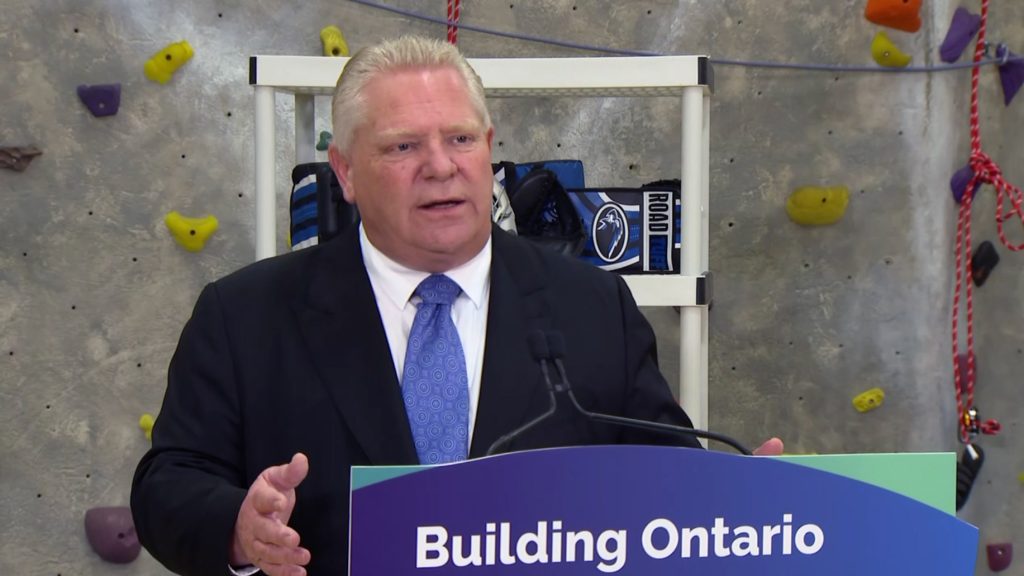Do Detox Programs Work?
Posted July 21, 2006 12:00 pm.
This article is more than 5 years old.
Every once in a while when we’re feeling sluggish or heavy we feel the need to purge our bodies of the toxins that have been building up inside – from alcohol to fatty and sugary foods.
But do so-called ‘detox’ diets and supplements actually work, and are they safe? Health experts have varied opinions on the benefits of detoxification – whether it’s a water-only fast, a diet of fruits and veggies, or a product you can buy at your nearest drug store.
Nutritionist Julie Daniluk is sold on the detox treatments. She follows a 35-day regimen of freshly squeezed juices and nine different herbal capsules as part of a liver cleanse.
“I feel so great. I definitely noticed my skin improved. I am amazed at how I am able to cope with more,” she said.
“I believe (detox treatments) do work, they help assist the body in moving the toxins from the bowel, liver, lymph, blood, kidneys – it’s an assistance.”
Over 50 percent of a cleanse is in the diet, Daniluk said, which should be packed with fruits and veggies and low on refined sugar and processed foods.
But modern Western medicine says there’s little evidence to back up Daniluk’s claims.
“A lot of it is placebo effect. It is the well being that people feel in doing something for themselves and focusing on their health and if that’s the benefit they are getting from it, it is probably okay,” CityNews Medical Specialist Dr. Karl Kabasele explained.
Here’s what you need to know if you’re thinking about flushing your system of toxins.
Be aware that while detoxification diets and alternative medicine might work for some, it might not be the healthiest solution for you. Here’s some advice from the Mayo Clinic on making an informed decision:
Try to be open-minded but also skeptical.
Take a critical look at the information you have. Scammers have perfected ways to convince you their complementary and alternative medicine products are the best. Here’s how to weed out the good products from the bad.
-
Investigate complementary and alternative medicine Web sites
The Internet offers an ideal way to discover the latest in complementary and alternative medicine. Web sites can be updated at any time to keep up with new products, therapies and advances in the field. But beware – the Internet is also one of the greatest sources of misinformation. - Check out the site sponsor. Web sites created by major medical centres, national organizations, universities and government agencies are the most credible.
- Determine the site’s objective. Is the sponsor trying to educate you or just sell you something? Stay away from sites that don’t clearly distinguish between scientific evidence and advertisements.
- Find out if the information is current. Look for a date. Older material may not include recent findings, such as newly discovered side effects or advances in the field.
Look for words of warning
Certain words and phrases can be warning signs of potentially fraudulent alternative medicine products. Look out for the following claims or practices:
- Red flag words. The advertisements or promotional materials usually include words such as “satisfaction guaranteed,” “miracle cure” or “new discovery.”
- Pseudomedical jargon. Though terms such as “purify,” “detoxify” and “energize” may sound impressive and may even have an element of truth, they’re generally used to cover up a lack of scientific proof.
- Cure-alls. The manufacturer claims that the product can treat a wide range of symptoms, or cure or prevent a number of diseases. No single product can do all this.
Anecdotal evidence. Testimonials are no substitute for solid scientific documentation. If the product is scientifically sound, the manufacturer will promote the scientific evidence.
False accusations. The manufacturer of the product accuses the government or a medical profession of suppressing important information about the product’s benefits. Neither the government nor any medical profession has any reason to withhold information that could help people.
Understand scientific studies
If you read about studies in journal articles, assess the quality of the research. Look for words such as “double-blind,” “controlled” and “randomized.” Doctors consider these types of studies to contain the most valuable information. Here are some common terms you’ll encounter in research articles:
- Clinical studies. These involve studies on human beings – not animals. They generally come after studies that demonstrate the safety and effectiveness of the treatment in animals and in the lab. Studies done solely in test tubes and petri dishes can’t prove benefit to humans.
- Randomized, controlled trials. Participants in these trials usually are divided into groups. One group receives the treatment under investigation. Another group may be a control group – participants receive standard treatment, no treatment or an inactive substance called a placebo. Participants are assigned to these groups on a random basis. This helps ensure that the groups will be similar.
- Double-blind studies. In these studies, neither the researchers nor the human subjects know who will receive the active treatment and who will receive the placebo.
Don’t forgo conventional treatment
Ideally the various forms of treatments you select should work together with the care of your doctor. You may find that certain alternative medicine treatments help you maintain your health and relieve some of your symptoms. But continue to rely on conventional medicine to diagnose a problem and treat diseases. For your safety, tell your doctor about all alternative medicine treatments you use.
Courtesy Mayo Clinic
Here are a few simple things you can do each day to help detoxify your body:
Eat fibre-rich foods, such as brown rice and organically-grown fruits and vegetables. Beets, radishes, artichokes, cabbage, broccoli and seaweed are all good choices to help in detoxification.
Consider taking a herbal supplement to help cleanse and protect the liver. Some good choices to try include: dandelion root, burdock and milk thistle, and drinking green tea.
Take a vitamin C supplement to assist the body’s production of glutathione, a liver compound that drives away toxins.
Drink at least 8 250mL glasses of water daily.
Take deep breaths to help oxygen circulate completely through your system.
Try to channel stress into more positive emotions.
You can give yourself hydrotherapy without visiting the spa. Take a very hot shower for five minutes, followed by cold water for 30 seconds. Repeat the cycle two more times, then get into bed for a half hour.
Sit in a sauna so your body can get rid of waste through sweating.
Remove toxins lodged in your pores by dry-brushing or exfoliating your skin.
Exercise for an hour each day – any form of exercise will do whether it’s running, swimming or practicing yoga.










